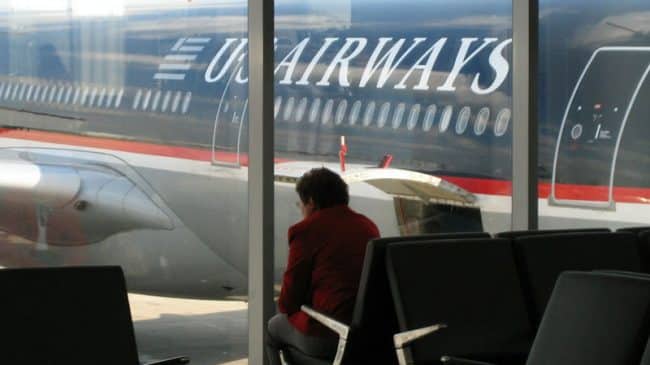The recently enacted airport security bill mandates that, starting tomorrow, every piece of checked luggage at more than 400 commercial airports in the U.S. must be screened for explosives. In theory, every checked bag will be inspected by one of the following: a million-dollar CT scanning machine, a bomb-sniffing dog, a hand search or by bag-matching.
You can scratch the scanning machines: Thousands are still needed and the government hasn’t even placed an order for them yet. The dogs aren’t ready either. There are only about 175 Federal Aviation Administration-certified canines and they are not suited to continuous, assembly-line bomb-sniffing duties. Hand searches are theoretically an option, but would cause unbelievable delays and cripple the still-struggling airline industry.
Which leaves us with bag-matching, originally intended to be a supplemental part of the process at best. Now, matching is the only way most airlines will meet tomorrow’s baggage-screening deadline. The airport security bill states that any airline unable to screen all checked luggage for explosives must have a system to match 100% of checked bags with passengers — that is, if the passenger is aboard the plane, the bag must be also.
Real security? No. Not even close.
Bag-matching won’t apply to connecting flights, leaving the system vulnerable to terrorists who fly with their luggage for the first leg of a flight and then fail to board connecting flights that their luggage is placed on. Furthermore, bag-matching would not have stopped the Sept. 11 terrorists. And it won’t stop individual suicide bombers like Richard Reid.
Reid checked no luggage when he boarded his flight in Paris with explosives in his shoes. Though initially questioned as a suspicious character, he ultimately passed through the metal detectors and carry-on bag X-ray machine at Charles DeGaulle International Airport. By concealing explosives on his person, he was able to gain access to the jetliner.
As such, Reid posed a far larger threat than if he had checked a suitcase containing the same quantity of explosives. According to FAA research, based on actual testing, a bomb in the cabin of an airplane is “much more critical” than a bomb in a cargo hold. That’s the case for three reasons. First, checked luggage is packed into cargo containers, which provide some shielding for blast effects. Second, a cabin bomb will cause explosive decompression of the cabin, whereas most cargo holds are not pressurized. And, of course, a bomb in the cabin is far more likely to kill nearby passengers directly, even if the plane itself remains flyable.
What defense do we have against future Reids? For now, all we have is the vigilance of passenger screeners. There are no technologies in place, or on order, to check all carry-on bags or all passengers for explosives. Highly trained bomb-sniffing dog units are currently deployed at just 39 of the nation’s largest airports.
Does that mean we need another congressional mandate and billions more spent to check every single passenger and carry-on bag for explosives? If we continue our current approach of 100% inspections, the only answer must be yes. But this glaring loophole suggests that we stop and think about the 100% requirement.
Spotting likely terrorists among the millions of ordinary passengers is akin to finding a needle in a haystack. The dumb way to find the needle is to examine every single piece of hay. The smart way is to subdivide the haystack into clumps: one clump of pieces where the needle could not possibly be; another clump of pieces where the needle is unlikely to be, but may be worth double-checking; and the small remainder of tiny pieces where the needle may actually be.
That’s what passenger screening systems are designed to do — narrow the pool to focus on the most likely. One type of passenger screening, already in use in this country, weighs a set of factors (officials don’t reveal the criteria) that appear to correlate with the possibility of being a terrorist and red flags those people for special attention.
Another type is voluntary screening. As used in Israel, voluntary screening allows people willing to submit to a one-time background check and security interview to obtain a trusted-traveler I.D. card and thereafter bypass a portion of the check-in procedures. This program, instituted four years ago at Tel Aviv’s Ben Gurion Airport, allows security personnel to focus more of their resources on serious threats and dramatically reduces long security lines.
Israeli citizens who have undergone a detailed interview and background check receive a trusted-traveler card and can get through the check-in process in 15 minutes. Travelers without the cards are subject to much more rigorous security measures and normally get through the process in about two hours.
In this country, millions of business travelers and frequent flyers would be willing to subject themselves to the background check. Extensive use of trusted-traveler cards would separate out the majority of passengers, leaving only a small and manageable group of people who would need to undergo more meticulous inspection of their persons and luggage.
Until and unless Congress rethinks its hasty overreaction to Sept. 11, we will continue to load billions of extra dollars onto the cost of air travel while meeting security deadlines in appearance only. At the same time, we’ll continue to delay the recovery of this vital industry by making air travel an unpleasant ordeal.
Robert W. Poole, Jr. directs the Transportation Studies Program at the Reason Foundation. He advised the White House Domestic Policy Council and several members of Congress on ways to improve airport security following the 9/11 terrorist attacks.

